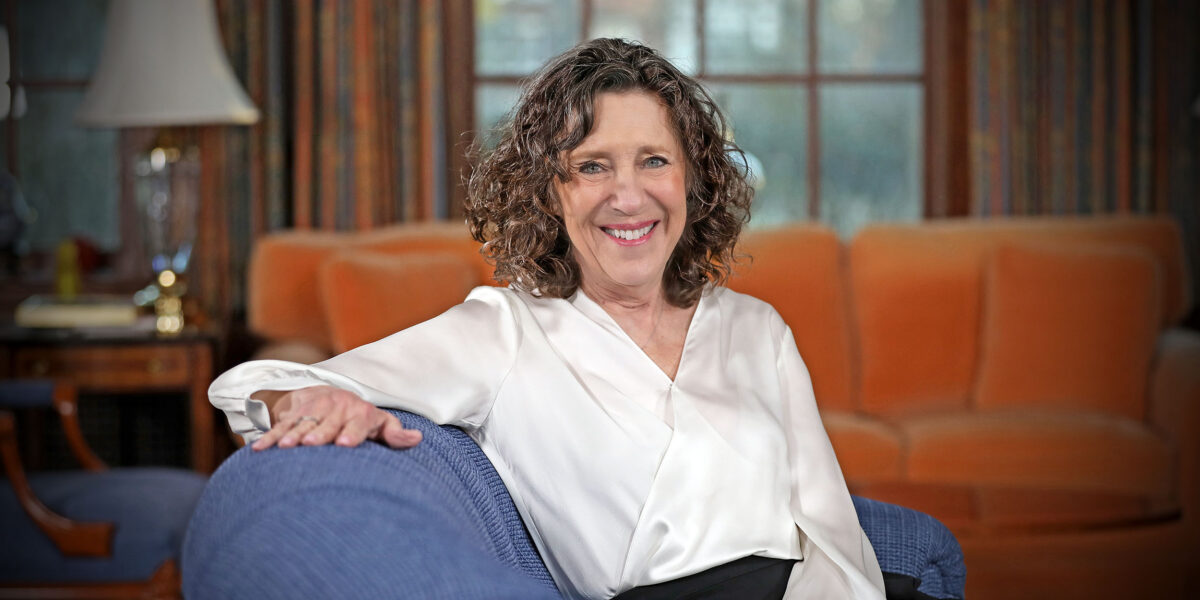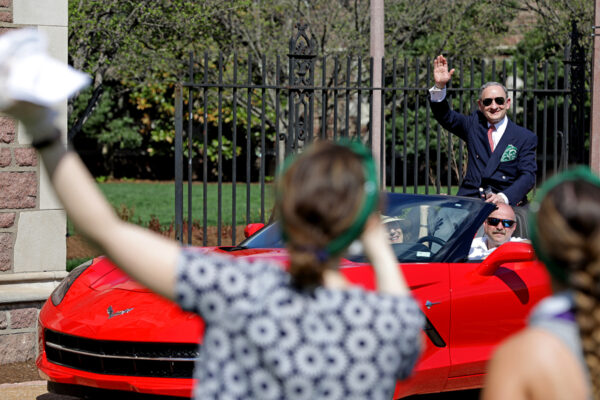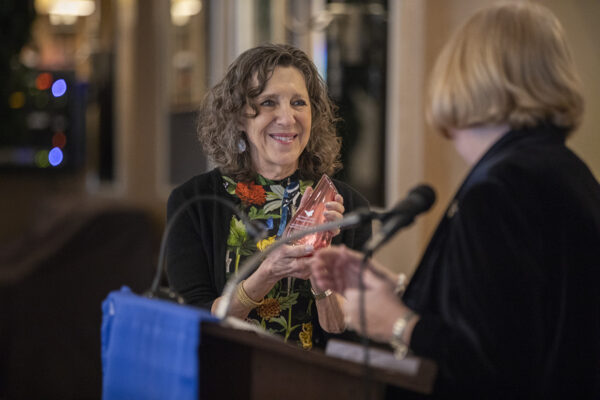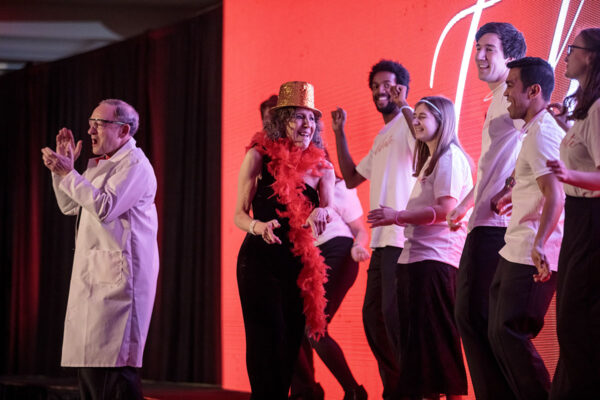Risa Zwerling Wrighton, PMBA ’89, stops her car in front of a modest brick house in North St. Louis. This used to be the home of Chelsea Harris, a teenager Risa mentored for eight years, until Chelsea died in December 2014 at the age of 16. Inside, there’s a poster-board display with Chelsea’s name written in glitter, surrounded by photos of her, a thin African-American girl in glasses, smiling slyly, heartbreakingly young. Among the display is also a framed St. Louis Post-Dispatch op-ed that Risa wrote after Chelsea died. Chelsea had been collateral damage in a drive-by shooting that was aimed at her boyfriend.
“We are a great country in many, many ways,” Risa wrote in her op-ed. “But we are sacrificing our right to life, liberty and the pursuit of happiness for the many who live in poor, underserved communities riddled with hopelessness and the crime that ensues.”
After the op-ed came out in December 2014, members from gun-control advocacy groups reached out to Risa to see if they could collaborate on some kind of meaningful action. As the first lady of Washington University — Risa has been married to Chancellor Mark S. Wrighton since 2000 — she offered up the university as a resource with the chancellor’s full support. Risa called a meeting to brainstorm with deans and leadership at the Institute for Public Health about what the university could do. The result was the 2015 yearlong initiative Gun Violence: A Public Health Crisis.
Several programs surrounding gun violence have grown out of the university’s efforts, and an article in the St. Louis Post-Dispatch about them has prompted Risa’s visit to Vernell Williams, Chelsea’s great-grandmother and legal guardian, who is bedridden and on an oxygen machine. January Harris, Chelsea’s mother, also happens to be at Williams’ home during Risa’s visit.
Williams’ bedroom is full of medical equipment, and a TV blares. Risa hugs Williams for a long moment, kissing the side of her head, and then apologizes for disturbing her. Williams, who sadly passed away a week later, struggles to speak, due to her illness, but says she likes company. Risa turns down the TV, pulls out the newspaper and, after a brief explanation, starts to read aloud.
The article describes Life Outside Violence, a program that offers patients who present with gun-related injuries at an area trauma hospital support to escape the cycle of violence. Another program is Stop the Bleed, which teaches people in the field — clergy, teachers, nurses, students and teenagers — how to stop bleeding at the scene of gun violence. As Risa reads, it’s clear that she’s proud, not necessarily of herself for getting the gun violence initiative started, but of the university that she’s a part of.
“It’s impossible to get any kind of ban on guns,” Risa says as she puts the paper aside, “but we’re making strides any way we can.” For Williams, it’s too difficult to speak, so Harris does. She talks about her youngest child, Janelle, who is in seventh grade at Lift for Life Academy, the same school Chelsea attended.
“I moved into the apartment complex in front of Canfield like three days before Michael Brown was shot,” she says. “After that, I told Janelle, ‘You can’t go out. Something is always happening around here.’”
The way gun violence and childhood have become, for some, so closely stitched together, Risa says, was her main concern when writing her op-ed in 2014. “What about our right for our children to grow up and live happy lives as opposed to the right to bear arms?” she asks.
This instinct, to protect, to care for, has been predominant throughout Risa’s life. It also has made her an exceptional first lady for Washington University.
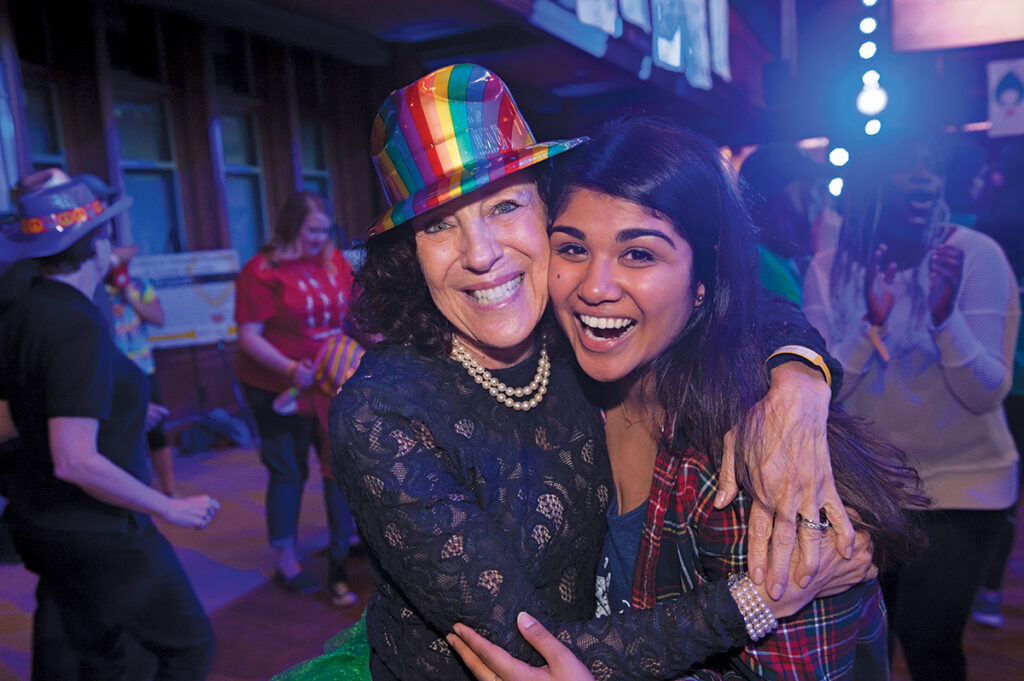
Risa was born in Brooklyn, New York, in 1948, and grew up in Queens. Her parents had both been performers, but her mother gave it up to become a secretary. Her father, though, still played the trumpet for a living, and Risa remembers him coming alive in the nighttime, putting on his tux, pomading his hair and heading out.
“My mother wanted him to get a nine-to-five job,” Risa says. But her father had grown up among Russian-German Jewish immigrants. Though his cousins had all become doctors and lawyers, they were broke growing up. He’d always had money in his pocket and didn’t want to give that up.
Risa spent summers in the Catskills, where she and her family would horseback ride. After her mother died, Risa’s father bought a house on the Arizona-Mexico border, where he kept horses. She says that on a trip to visit her father, Chancellor Wrighton bought his first ever pair of “dungarees,” as he called them, so he could ride.
“Otherwise, he’d have gone out in a double- breasted suit,” she says with a laugh.
Risa stayed in New York for university, attending Barnard College. She was a commuter student and saw all the anti–Vietnam War protesting and counter-culture up close but wasn’t as much a part of it. Instead, Risa spent her time in the lab, writing long reports as she studied psychology, a program far more clinical than she had anticipated. For money, she had a part-time job working for a fabric company to design textiles that would appeal to young people. Risa thought the work was fun, but when she graduated, it was time to move on.
“I wanted to become a social worker,” Risa says, and Barnard’s career center set her up with a job at Bird S. Coler Hospital, a hospital serving people with chronic diseases or injuries requiring lifelong care. Secluded on what was then Welfare (now Roosevelt) Island, Risa remembers it as an inspiring place where the patients ruled.
“So here I am with my miniskirt; I’m 22, but I look 12 years old; the whole thing was like they were raising me,” Risa says with a laugh. She recalls holding group therapy sessions that “would turn into very lively gripe sessions,” organizing cooking courses, and becoming friends with the social workers and patients.
This solidified Risa’s career aims, and she enrolled at University of Maryland in Baltimore to earn her master’s degree in social work. She took to it, doing practicums in foster care and through the Jewish Federation. After graduating in 1975, she worked at Baltimore’s Sinai Hospital as a psychiatric social worker. While in Baltimore, she’d also met her husband, Robert Schmidt, a Vienna-born but St. Louis–raised clothing manufacturer. They married and moved to St. Louis in 1978.
“I thought I had fallen off the end of the earth,” Risa says about coming to the Midwest. “I had Imo’s pizza and went into shock over them calling it pizza. I thought I’d made the worst mistake of my life.” She laughs about it now.
She worked at Missouri Baptist Hospital as a social worker in the psychiatric unit. She had her first daughter, Anna, in 1980, and her second daughter, Leah, followed in 1984.
“I’d been so anxious to get into a clinical setting where I could work one-on-one with people, but I burned out,” Risa says. “I think when you have your own children, just keeping your family going is all the social work that you need.”
It was the late 1980s, a time of rapid transition for Risa. In 1987, she enrolled in Washington University’s evening MBA program and also got divorced. After graduating in 1989, Risa worked with Citicorp Mortgage in the direct-mail marketing department. She soon became assistant vice president. It is to this experience in “targeting her audience” that Risa, jokingly, attributes the success of her most famous letter.
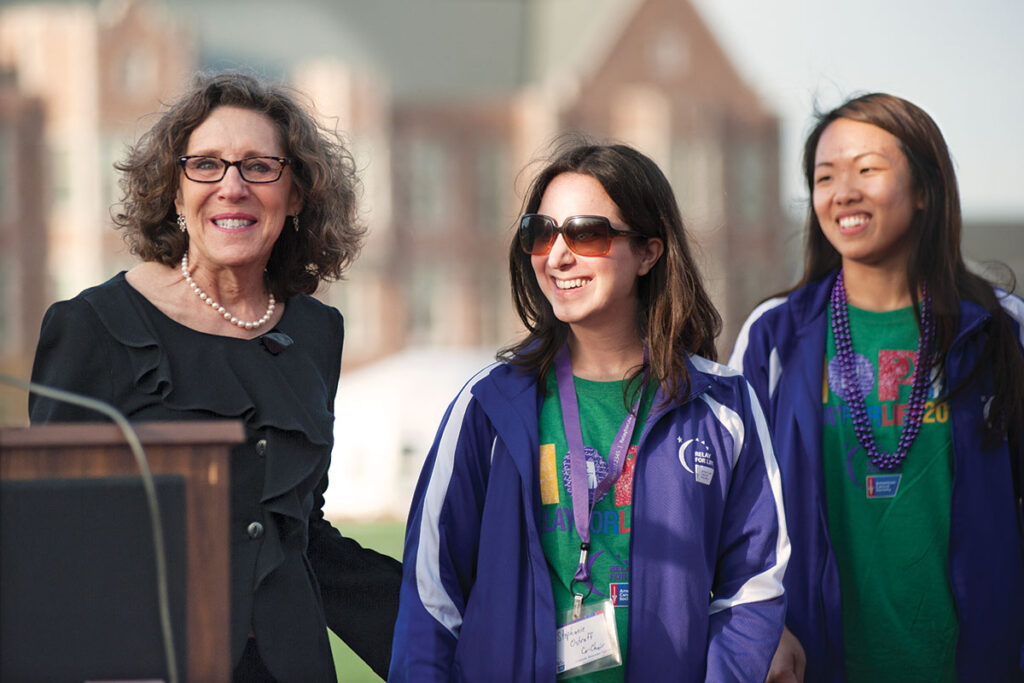
It’s 10 a.m. on a Thursday, which means that Risa is gathered with some of her closest friends for coffee. They meet weekly to discuss their families, their health, the latest happenings. But mostly they get together just to laugh.
Most of them met Risa after her days at Citicorp Mortgage, which decentralized so “everybody was out of a job,” as Risa puts it. It was then she decided she wanted to go back to helping people, but not one-on-one. In 1992, she started working for Personal Performance Consultants, which created and managed employee-assistance programs. The company is now Magellan Health Services.
“Risa’s not just entertaining and fun to be with. She’s very empathic. She’s with you. She’ll laugh with you and cry with you.”
Judy Goodman, MSW '75
Today, two former co-workers, Tami Fernandez and Karen Friedman, have gathered for the coffee chat along with Judy Goodman, MSW ’75, who met Risa because their kids went to the same daycare. All of them have been friends longer than Risa has known her husband, so they were all there when, in 1995, Risa decided to write a letter introducing herself to Washington University’s new chancellor, Mark S. Wrighton, suggesting that they meet.
“I wanted to get close to a genius,” Risa says.
“I edited the letter,” Friedman adds with a laugh. The letter was typewritten but in a cursive font, and Risa included her phone number. The letter ended up in his junk mail, but Wrighton rescued it.
“I thought maybe she was trying to sell me insurance,” Wrighton says about the letter. But he called her, and when he asked, Risa told him she didn’t have any interest in the university. She just wanted to meet him. “He said, ‘Splendid,’” Risa says. (Wrighton doesn’t remember saying that.) They arranged to have lunch.
Risa met Wrighton at Cardwell’s in mid-July and remembers it felt like it was 115 degrees outside. But Wrighton looked “cool as a cucumber” in a double-breasted suit and polka-dot tie.
Risa and her friends still laugh about Risa’s early dates with the chancellor, including one where she asked him to take a walk. Before the date, he went to the Alpine Shop to buy “walking shoes,” which turned out to be hiking boots. (They came in handy more than a decade later when the couple went on safari in Africa.) He was formal, and she wasn’t sure they were connecting.
Then tragedy struck. Her ex-husband died.
“The last thing on my mind was the chancellor,” Risa says. “When I finally told him what happened, the real guy came out. All the formality and the wondering what I was up to, that all fell away. And from then on, he was 100 percent ‘what can I do to help you,’ and he still is to this day.”
Now her friends call her “chancellorina.” But jokes aside, they are not only happy that Risa found the chancellor, but glad that the chancellor found Risa.
“Risa’s not just entertaining and fun to be with. She’s very empathic,” Goodman says. “She’s with you. She’ll laugh with you and cry with you.”
“There’s no problem that doesn’t have a solution for Risa,” Friedman says. “She lives her life that way. She faced challenges, and she adapted and dug in. She raised two kids while earning a master’s degree and changing careers. She’s fearless.”
And as things got serious with Wrighton, Risa remained fearless. She had no idea other women had wanted to introduce their sisters and daughters to the chancellor. But she got the hint when she started showing up at university functions and would be seated several tables away from Wrighton.
“I would rearrange the place cards so that Risa would be seated next to me,” Wrighton says. They took things slow. They embraced each other’s families (Wrighton has a son, JJ, and daughter, Rebecca, from his first marriage). But Risa wasn’t interested in finding a replacement dad for her daughters.
“I wanted to be [my daughters’] parent. I didn’t want to bring any other variables into it,” Risa says. The couple dated five years and got married in 2000 at Harbison House, the chancellor’s residence.
“I married a giant,” Risa says with a smile.
For a while, after getting married, Risa had two jobs. She had her day job at Magellan and her “night job” going to parties and events with Wrighton.
“It was thrilling. I felt as if I had jumped into a vat of chocolate,” Risa says, referencing an old Smothers Brothers skit.
Despite still working, Risa started Home Plate in 2002, as a way to connect the campus with the community. Her daughter, Anna, who had gone off to college in the meantime, had dined at a professor’s house, and it had helped combat homesickness. Risa wanted to replicate that at WashU and asked families living near the university to host a student or two for dinner a few times over the year. Risa recruited both students and family volunteers and did the matching.
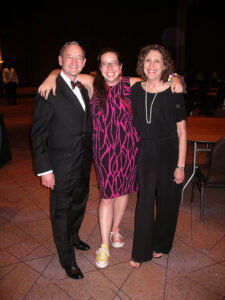
“I started with my friends. I had 30 or 40 kids that first year or two,” she says. The program grew, and now she gets about 350 kids per year to match.
By 2006, Risa was ready to retire from Magellan, but she wasn’t sure what she’d do next. She was home one afternoon when James McLeod, former vice chancellor for students and dean of the College of Arts & Sciences, called her and asked if she wanted to be a student adviser. She agreed.
Stephi Blank, AB ’10, was in Risa’s first advising cohort and looked up her adviser on the university website. Nothing popped up.
“I don’t fully remember having an attitude,” Blank says. “But I guess I had a little bit of one about how I had this new professor and she wasn’t going to know anything.” Blank showed up to their first meeting in basketball shorts, and another advisee in the group was shocked. “Don’t you know whom we’re meeting?” the other girl asked. Blank did not, but she soon found out.
“We immediately clicked after that,” Blank says. “She was my go-to for everything.”
Risa helped direct Blank toward her major, film and media studies, and was always available for a chat. They would often have lunch together or take walks. “She was a confidante,” Blank says. “I didn’t have to go to my parents or to a professor who maybe wouldn’t understand. She was this person who existed in both worlds yet always wanted what was best for me.”
Risa immediately enjoyed advising. “I wasn’t a very good social worker because I would mother my clients instead of intervene therapeutically,” Risa says, “and all the training in the world couldn’t beat that out of me. And that’s exactly how I went about my advising. They all became my children, and by extension, I really started considering all 7,000 kids my very large family.”
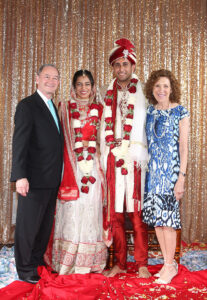
Risa became a fixture of student life. She kept office hours, and students who weren’t her advisees would stop by, usually to try to indirectly get some information to the chancellor. But they also came by to talk or for knitting lessons that evolved into a knitting circle.
She would attend Diwali and Mx. WashU, a student-organized fashion show and fundraiser. And Risa and the chancellor were regulars at Dance Marathon, a student-run dance fundraiser put on for Children’s Miracle Network. For it, Risa invented “The Dancellor,” which pays tribute to Wrighton’s affinity for cufflinks and double-breasted suits.
“She’s the most positive and upbeat human being I’ve ever met,” Blank says.
Harita Shah, BS ’11, remembers being interviewed by Risa for the Danforth Scholars Program. When Harita received the scholarship, she reached out to Risa to thank her. The two became close, and Harita even invited the Wrightons to her wedding.
“She has an enthusiasm for life that’s very contagious,” Harita says. “She always made me feel at home at WashU.”
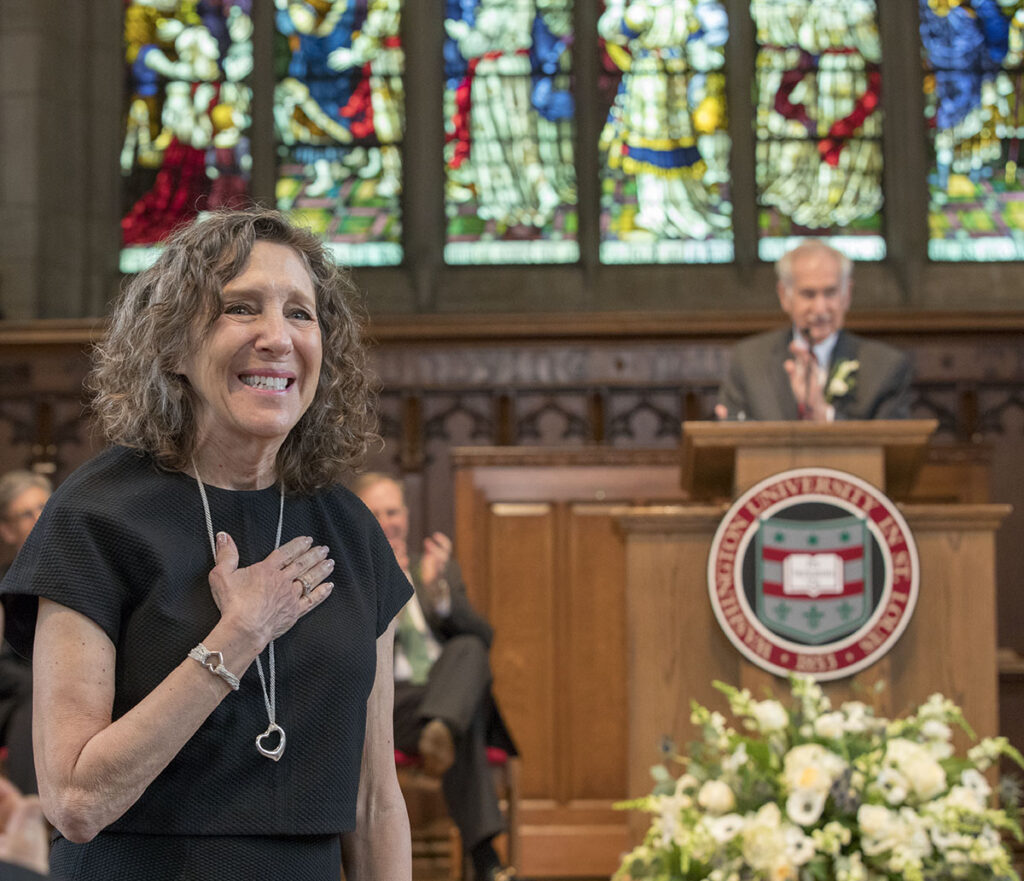
Photos by Joe Angeles/Washington University
Risa exceeds at making people feel at home. This is clear at one of the last major galas under the Wrightons. It is to celebrate the end of Leading Together: The Campaign for Washington University, which raised $3.378 billion, and to celebrate the Wrightons’ legacy.
Accolades pour in for Wrighton and Risa, including building namings — Lab Sciences will be named for Wrighton and College Hall for Risa — scholarship namings, a portrait and a new street named Wrighton Way on the east end of campus. It’s honors from a university that Risa felt lucky to serve.
“We’ve been the ones who have been so wonderfully taken care of,” Risa says.
Risa had been talking, several days before, about how she was struggling to write her remarks for the gala. She commented more than once about the crowd size, more than 1,200. But when she steps to the podium, she is poised and calm, and her husband never leaves her side, helping her keep her pages in order as she talks.
Her talk is peppered with jokes: “The Beatles were right: all you need is love.” She hums a few notes. “And $3.4 billion.”
She compares their stepping down from their role to sending a kid off to college. “Mark and I feel very confident letting our child go. We know WashU will be very well cared for,” she says. “But nervous parents that we are, we bought a house across the street from the university. And in case any of you get homesick, come on over for dinner.”
She laughs, and the crowd laughs with her. But we actually are all invited to the Wrightons’ table. Risa wouldn’t have it any other way.
